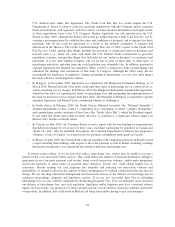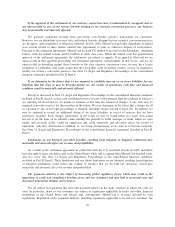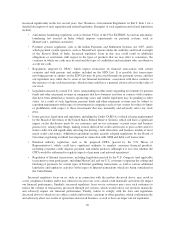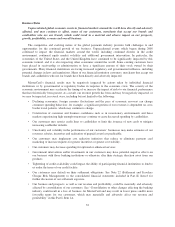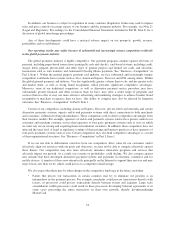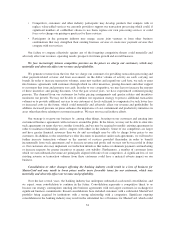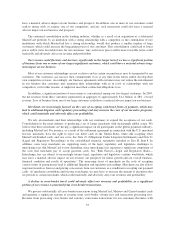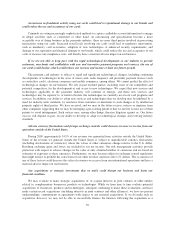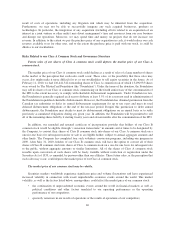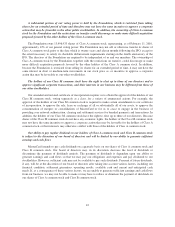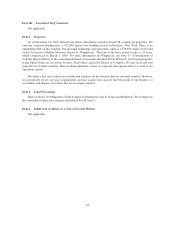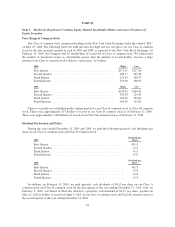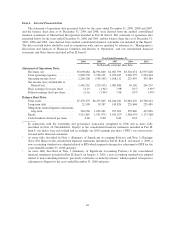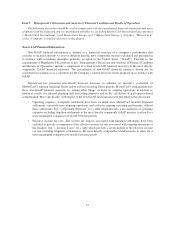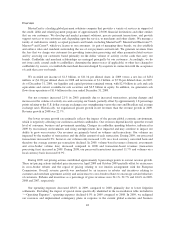MasterCard 2009 Annual Report Download - page 48
Download and view the complete annual report
Please find page 48 of the 2009 MasterCard annual report below. You can navigate through the pages in the report by either clicking on the pages listed below, or by using the keyword search tool below to find specific information within the annual report.merchant payment obligations. Our estimated MasterCard-branded gross legal settlement exposure, which is
calculated using the average daily card charges made during the quarter multiplied by the estimated number of
days to settle, was approximately $26 billion as of December 31, 2009. We have a revolving credit facility in the
amount of $2.5 billion (which, by its terms, will decrease to $2.0 billion in April 2010 for the final year of the
facility) which could be used to provide liquidity in the event of one or more settlement failures by our
customers. In the event that MasterCard International effects a payment on behalf of a failed member,
MasterCard International may seek an assignment of the underlying receivables from its members. Subject to
approval by our Board of Directors, such members may be charged for the amount of any settlement loss
incurred during these ordinary course activities of MasterCard. While we believe that we have sufficient liquidity
to cover a settlement failure by any of our largest customers on their peak day, concurrent settlement failures of
more than one of our largest customers or of several of our smaller customers may exceed our available resources
and could materially and adversely affect our business and financial condition. In addition, even if we have
sufficient liquidity to cover a settlement failure, we may not be able to recover the cost of such a payment and
may therefore be exposed to significant losses, which could materially and adversely affect our results of
operations, cash flow and financial condition. Moreover, during 2009, many of our financial institution
customers were directly and adversely impacted by the unprecedented events that occurred in the financial
markets and the economic turmoil that ensued around the world. These events present increased risk that we may
have to perform under our settlement guarantees. For more information on our settlement exposure as of
December 31, 2009, see Note 22 (Settlement and Travelers Cheque Risk Management) to the consolidated
financial statements included in Part II, Item 8.
If our transaction processing systems are disrupted or we are unable to process transactions efficiently or
at all, our revenue or profitability would be materially reduced.
Our transaction processing systems may experience service interruptions as a result of process or other
technology malfunction, fire, natural or man-made disasters, power loss, disruptions in long distance or local
telecommunications access, fraud, terrorism, accident or other catastrophic events. A disaster or other problem at
our primary and/or back-up facilities or our other owned or leased facilities could interrupt our services. Our
visibility in the global payments industry may also attract terrorists and hackers to attack our facilities or
systems, leading to service interruptions, increased costs or data security compromises. Additionally, we rely on
third-party service providers for the timely transmission of information across our global data transportation
network. If one of our service providers fails to provide the communications capacity or services we require, as a
result of natural disaster, operational disruption, terrorism or any other reason, the failure could interrupt our
services, adversely affect the perception of our brands’ reliability and materially reduce our revenue or
profitability.
Account data breaches involving card data stored by us or third parties could adversely affect our
reputation and revenue.
We, our customers, and other third parties store cardholder account and other information in connection
with payment cards bearing our brands. In addition, our customers may sponsor third-party processors to process
transactions generated by cards carrying our brands. A breach of the systems on which sensitive cardholder data
and account information are stored could lead to fraudulent activity involving cards carrying our brands, damage
the reputation of our brands and lead to claims against us. In recent years, there have been several high-profile
account data compromise events involving merchants and third party payment processors that process, store or
transmit payment card data, which affected millions of MasterCard, Visa, Discover and American Express
cardholders. As a result of such data security breaches, we may be subject to lawsuits involving payment cards
carrying our brands. While most of these lawsuits do not involve direct claims against us, in certain
circumstances, we could be exposed to damage claims, which, if upheld, could materially and adversely affect
our profitability. In addition, any damage to our reputation or that of our brands resulting from an account data
breach could decrease the use and acceptance of our cards, which in turn could have a material adverse impact on
our transaction volumes, revenue and future growth prospects, or increase our costs by leading to additional
regulatory burdens being imposed upon us.
38


